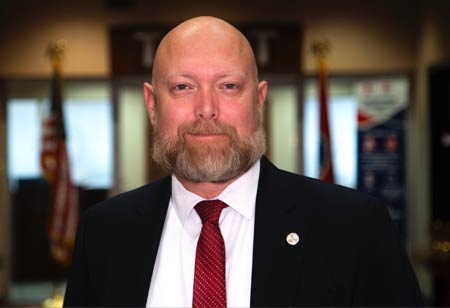

Thank you for Subscribing to Gov Business Review Weekly Brief

Chris Yarbrough is the Director of Procurement, Contracting and Inventory at the Tennessee Department of Transportation (TDOT). He was part of establishing Tennessee’s centralized procurement office in 2012 and joined TDOT in 2017 to standardize its procurement processes. In 2019, Yarbrough established TDOT’s Procurement and Contracts Division, focusing on education, support and accountability for the department’s 180 buyers statewide. Under his leadership, TDOT has implemented robust training, compliance, and support programs to streamline and professionalize procurement across the organization.
Through this article, Yarbrough shares his insights on the need for more flexible, tailored approaches when contracting for professional services to accommodate the unique needs of service providers in the public sector. What are some of the key roles and responsibilities that you have daily? As the Director of Procurement, Contracting, and Inventory at the Tennessee Department of Transportation (TDOT), I oversee the education and training of the department’s 180 buyers located across the state. A major focus is ensuring these buyers receive robust training on proper procurement processes, policies and best practices. My team has implemented comprehensive education programs to build expertise and consistency in how procurement is handled throughout TDOT’s decentralized operations. I am also responsible for providing direct support and guidance to buyers, whether located at TDOT’s headquarters or in regional field offices. My team serves as an expert resource for buyers navigating complex, high-value solicitations. They help define solicitation requirements, evaluate contract models and analyze the pros and cons of different procurement approaches. This guarantees that TDOT follows sound strategies tailored to each procurement scenario. Establishing clear accountability measures and ensuring compliance with procurement rules is also a paramount responsibility. I have institutionalized strict programs to monitor adherence to TDOT’s standardized policies and procedures across all purchasing activities. My division maintains open lines of support to assist buyers with any daily procurement needs or issues that may arise, promoting a culture of compliance. As an industry veteran, what would you say are some of the major challenges and trends that exist in the marketplace today? Fleet purchasing remains a significant challenge we grapple with, exacerbated by the pandemic’s lingering effects. Since COVID-19, securing fleet vehicles within desired timeframes has been an uphill battle, prompting us to get creative year after year. While the commercial vehicle market for individual consumers may be inching closer to recovery, the fleet segment continues to lag behind our expectations. “I believe more organizations will leverage cooperative and volume-based purchasing methods, but this approach isn’t a one-size-fits-all solution.” To address our evolving needs, we actively explore more agile contracting methods, such as cooperative purchasing agreements. We frequently leverage contracts from the National Association of State Procurement Officials (NASPO), renowned for their flexible contracting approaches. NASPO’s cooperative contracts allow high-level state participation while adhering to individual state requirements, a considerable advantage we aim to capitalize on moving forward. We use General Services Administration (GSA) contracts, which, although not new, have become increasingly valuable tools to meet our demands efficiently. In the pre-pandemic era, we could often conduct solicitations independently and secure services at reasonable, fair prices. The escalating demand and volume purchasing have rendered these cooperative contracts from NASPO and GSA invaluable resources, enabling us to navigate the current landscape more effectively. What are some of the major advancements that you envision in the contracting space? Looking ahead, I believe more organizations will leverage cooperative and volume-based purchasing methods, but this approach isn’t a one-size-fits-all solution. For commodity purchases, I foresee an increased reliance on cooperatives and volume-based contracts to achieve better pricing and maximize taxpayer dollars amidst rising costs. Cooperative contracting offers tremendous value in this regard. For professional services, the opposite approach may be more effective. Rather than joining large consortiums, working one-on-one with service providers could yield better outcomes, especially in the public sector. At TDOT, we often require engineering, consulting, environmental and planning services–areas where flexibility and tailored solutions are crucial. Governments haven’t always excelled at accommodating the unique needs of service providers. Tennessee has made significant strides over the past decade, but all public entities must continue evolving to create a more adaptable environment for professional services contracting. While volume purchasing is advantageous for commodities, tailored, collaborative approaches are key when engaging professional service firms. By recognizing these nuances and adopting appropriate strategies, we can optimize value and outcomes across diverse procurement needs. What would be your piece of advice that you could impart to a fellow peer or an aspiring professional in the industry? For those in public procurement, my advice is to become invested in the services you provide across the government. One of the most rewarding aspects of this field is the constant variety—each project demands procuring different goods, services and contracts. Immerse yourself fully in understanding the nuances of each endeavor as you develop solicitations and facilitate the process. Invest in the profession of procurement and contracting itself. Deepening your expertise in this domain will pay dividends across various business areas. Although potentially undervalued at times, the ability to craft fair, value-driven contracts that benefit all parties is an invaluable skill. When individuals dedicate themselves to mastering this craft, it can pave the way for a long, prosperous career filled with exciting opportunities. The key is to approach each procurement challenge with genuine investment—in the specific needs at hand as well as the overarching principles and best practices of the field. This dual commitment to subject matter expertise and professional development can open doors to remarkable growth and achievement.I agree We use cookies on this website to enhance your user experience. By clicking any link on this page you are giving your consent for us to set cookies. More info